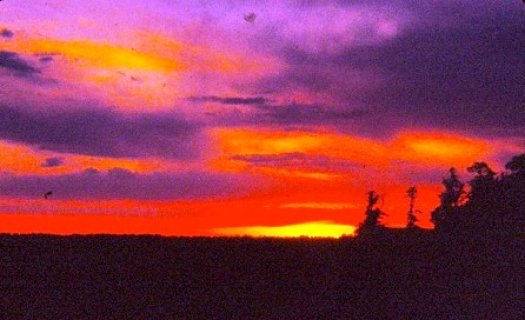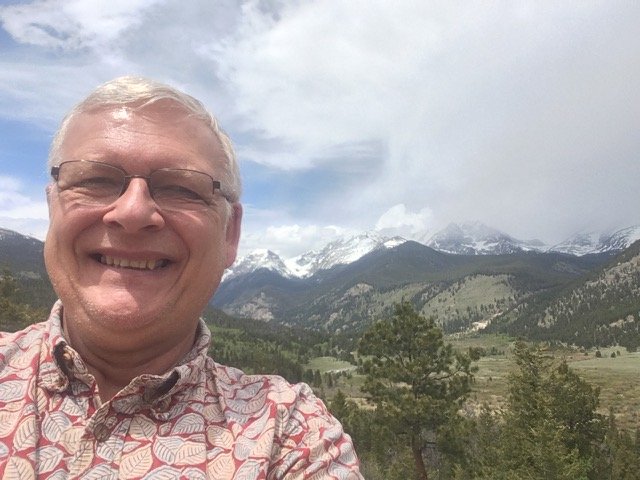Tony Gray, fellow volunteer that year, remembers him well: "Dan of course was terrific, absolutely in there all the time, 100% on message and there’s lovely pictures of him singing with the kids which everyone loved and he was so good at. I remember he and I spent a lot of time caring for a boy called Steven, who used to keep apologising to us and Dan would say nien problema Steven – nien problema, which made Steven laugh, and came about because we looked on Dan’s application form and it said he could speak German – which I don’t think he could really – so we kept saying – "in German Dan!" He was wonderful."
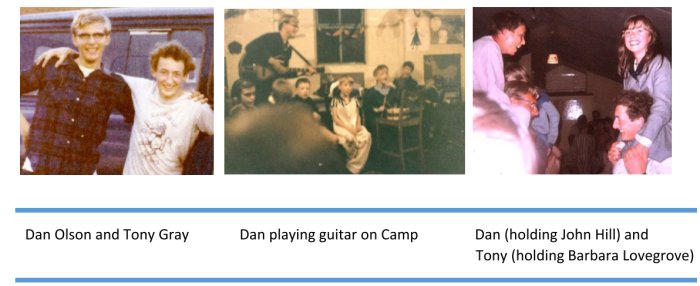
Dave Yapp who was a boy on Junior camp in 1968 says “one memory that stands out is Dan Olson playing his guitar before bed, singing a song that still brings tears to my eyes now which was ‘We Shall Overcome’, which relates to Martin Luther King”.
We caught up with Dan via email in 2017 and he will be coming back to join us at the 50th Anniversary Ball for the first time since 1968. We also have an old 1 7/8 inch tape that Dan sent over to play as a message to all of the Junior and Senior children at the 1968 PHAB Christmas party!
Dan's Story
My time with PHAB Camps, including all the preparations and follow–up, was a highlight of my young adult life. I recall it all fondly, save for the steady diet of beans we were fed. The kids, Tony Gray, fellow volunteers, and the entire concept, evoke warm memories and big smiles. Then there was that bed race near Sharpness, but I cannot recall how it ended, because I think we stopped in one or more pubs to keep hydrated.
I’m delighted to be contacted by PHAB again, thank you. I briefly checked out your website, and am humbled to realise all what emerged from our relatively small beginning in ’67 – ’68. Speaking to those involved now, though we don’t know each other personally, opens a wonderful window into shared experiences that impacted us and so many others from so long ago through today and clearly moving forward in time.
1. How did you come to hear about Birmingham PHAB Camps and what drove you to apply?
1967 was a time of multiple losses and anxiety for me as a second year college student. Though “religious” at the time (I’m not now, but respect those who are), I needed more tangible, physical experiences to grow as a person. Traveling to Europe was a common “quest” for folks my age, but I wanted to be more than a tourist – thus a service project. Even though the charity was just one year old – clearly news of Birmingham PHAB camps must have reached the States and it sounded fun!
2. What was it like travelling over to the UK back in the 60’s?
One foggy morning we boarded the MS Aurelia, an Italian vessel known as a “student–ship” because of its inexpensive passage, then finally docked in Southampton 8.5 very stormy days later. I was travelling with other American students coming to volunteer in Europe on all sorts of different projects. There were six of us, I think, who had chosen Birmingham PHAB Camps.
The ship was the smallest vessel licensed to carry passengers across the North Atlantic at the time (maximum 800 Passengers and crew). Very stormy seas occupied us for 6.5 of those days, many parties were held, friendships made, guitars played, drinking habits refined, studies done. We were tossed from the dining chairs to the deck, along with our food because the ship had no stabilizers (imagine a very large cork on an even larger tempestuous ocean). There were even twins born on–board two months prematurely. My grandfather had travelled on a troop–ship to Europe in WWI and advised me to eat and look far into the horizon to keep from getting seasick. Thanks Grandpa, it worked!
My first true introduction to Birmingham PHAB Camps came during our pre–camp stay and orientation at a guesthouse I can no longer recall the name of. I remember meeting Tony Gray, and his enthusiasm and genuine respect for all the PHAB volunteers enabled each of us to feel instantly connected. I volunteered to work with Tony and a small committee selecting campers, learning of their needs, special disabilities, and goals gleaned from the children and adults working with them. I was a shy kid from rural, agrarian Wisconsin, very sheltered and naive about the larger world. Because of this extra preparation time, I felt much more involved than I may have if I’d only showed up for the camp itself. PHAB was using some space in the Birmingham Young Volunteers Trust office near the city centre so it all felt like I was part of the administrative team!
3. What is your first memory upon arrival?
First memory and feeling docking at Southampton – gratitude for solid land!
First memory by bus to London – messing up currency at fish & chip shop.
First memory in London – train strike, so we slept in idle cars.
First memory at PHAB orientation – enthusiasm, followed by very mouldy bread.
First memory of Tony Gray – Excitement. Gratitude. Optimism. Energy!
First memory of looking after the children at first camp – helping a young man go to the toilet and realising how we take such an act for granted! He had no arms, only fingers attached to shoulders, so he was always reliant on others helping him go to the toilet. So I soon learnt what being a PHAB volunteer meant! Initially it was awkward, but soon routine; I mean everybody pees right?! – Lesson one in adapting to other people’s needs.
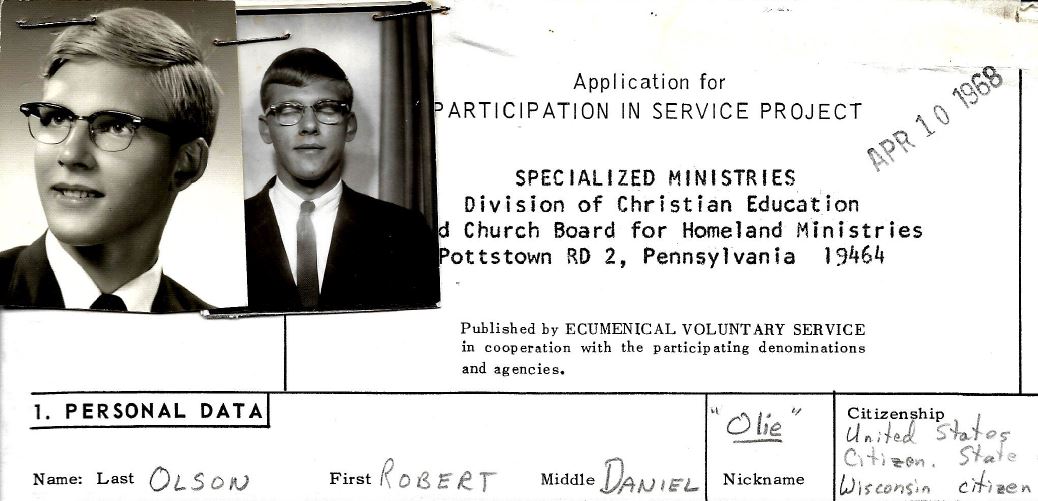
4. Had you worked with disabled young people before? How did you find it?
No, never before PHAB, but in the following years I always tried to find ways of supporting others. I found it humbling, as it opened my eyes, heart and mind to the reality of being truly human, despite the physical body.
5. The whole purpose of the camps is to integrate disabled and non–disabled children and help them make friends. Do you feel that worked well on your camps? Do you have any particular memories of that?
Absolutely it worked, sometimes naturally because children and teens can be open, empathetic, engaging, and playful. Sometimes a little modelling or nudge was needed to remind all that we could be companions and friends. Gosh virtually ALL my memories reflect how vital, nourishing and effective that process was to our camps in ’68.
6. What are your key memories of the camp?
Enthusiasm. Gratitude. Fatigue. Gratitude. Glee. Gratitude. Frustration. Gratitude. Humility. Gratitude. And overall – Gratitude!
7. Who stood out for you in terms of the children (this can be names – or simply memories of what it was like assisting and playing with them)?
Smiles on faces the children mostly all of the time, irrespective of their circumstances. One of the most challenging campers was a girl named Gillian, who challenged our creativity, perseverance, good humour, and patience. We ended on good terms.
8. What were the daytime and evening activities like?
Day time activities were active, involved, creatively challenging, and again, humbling. Evening activities seemed more “family–oriented” bonding with each other, reflecting on the day, slowing down for bed, carrying out personal care and just looking out for any and all children, irrespective of physical status.
9. What do you remember of hanging out with the volunteers and do any stand out?
Memories of volunteers are nearly all positive. There were a couple who did not seem to want to give all they could, and needed modelling, encouragement, and even a figurative kick in the butt. Tony Gray stands out most for me, in every way. I felt I achieved good working relationships with most others, but Tony was my “go–to–guy” for support, encouragement, learning, and patience.
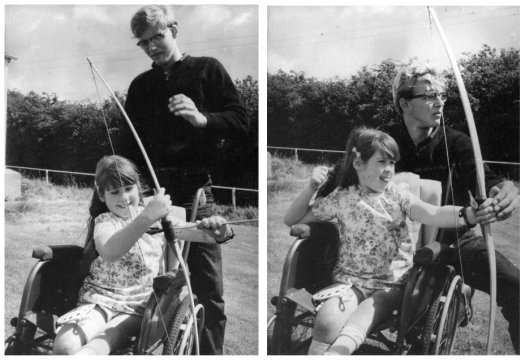
10. Do you think being on a PHAB camp changed you?
Absolutely it changed me, by helping me mature, become more outgoing, confident, empathetic, and willing to embrace new people and situations.
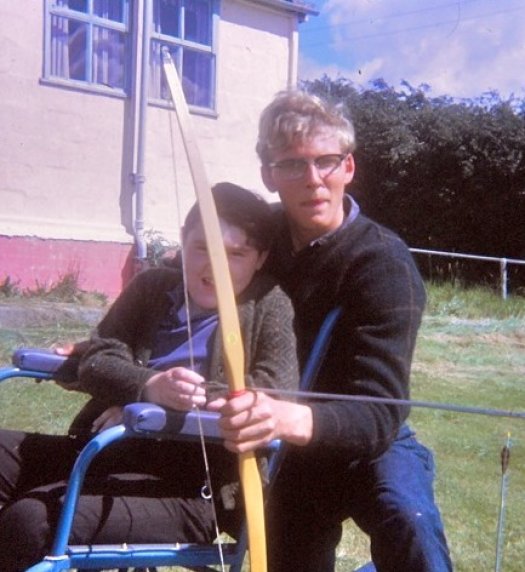
11. What are your thoughts on the whole experience now looking back?
Gosh – I have nothing to add but my gratitude, respect and love for Birmingham PHAB Camps.
Over time I comprehended that we are all “TABS” – "Temporarily Able–bodied Spirits.” I volunteered in the Uptown Neighbourhood of Chicago, especially focused on kids with disabilities who felt alienated from their peer group. I became a clinical psychologist with persons challenged by ALS, MS and many other physical maladies. I doubt I would have done this without Birmingham PHAB Camps. The opportunities and people I shared time with on PHAB in that old centre near Sharpness were awesome.
Today I continue playing guitar and enjoy photography. I feel my life winding down, and want my kids and grandkids to know me fully; thus having chance to share with them my small part in the PHAB legacy is so wonderful. I endeavour that they might explore opportunities to give, grow – and receive – similar to my time with PHAB.
I fondly recall the profound and positive effect of our work together in that summer of ‘68. I am thrilled Birmingham PHAB Camps continues and that it has expanded so widely and deeply. I feel privileged to have had this experience in my life. I applaud your success and dedication.
